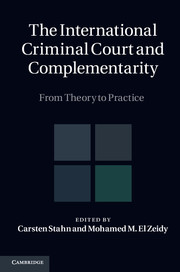Book contents
- Frontmatter
- Contents
- Acknowledgments
- Foreword by HE Judge Sang-Hyun Song
- Foreword by Patricia O’Brien
- Foreword by Silvia A. Fernandez de Gurmendi
- List of abbreviations
- Introduction: bridge over troubled waters?
- PART I General reflections
- PART II Origin and genesis of complementarity
- PART III Analytical dimensions of complementarity
- PART IV Interpretation and application
- PART IV (Continued) Interpretation and application
- PART V Complementarity in perspective
- PART VI Complementarity in practice
- 31 Making complementarity work: maximizing the limited role of the Prosecutor
- 32 Positive complementarity in action
- 33 Complementarity and the construction of national ability
- 34 The Colombian peace process (Law 975 of 2005) and the ICC’s principle of complementarity
- 35 Darfur: complementarity as the drafters intended?
- 36 Complementarity in Uganda: domestic diversity or international imposition?
- 37 Courts, conflict and complementarity in Uganda
- 38 Chasing cases: the ICC and the politics of state referral in the Democratic Republic of the Congo and Uganda
- 39 A problem, not a solution: complementarity in the Central African Republic and Democratic Republic of the Congo
- 40 Complementarity and the impact of the Rome Statute and the International Criminal Court in Kenya
- Index
- References
36 - Complementarity in Uganda: domestic diversity or international imposition?
from PART VI - Complementarity in practice
Published online by Cambridge University Press: 05 November 2014
- Frontmatter
- Contents
- Acknowledgments
- Foreword by HE Judge Sang-Hyun Song
- Foreword by Patricia O’Brien
- Foreword by Silvia A. Fernandez de Gurmendi
- List of abbreviations
- Introduction: bridge over troubled waters?
- PART I General reflections
- PART II Origin and genesis of complementarity
- PART III Analytical dimensions of complementarity
- PART IV Interpretation and application
- PART IV (Continued) Interpretation and application
- PART V Complementarity in perspective
- PART VI Complementarity in practice
- 31 Making complementarity work: maximizing the limited role of the Prosecutor
- 32 Positive complementarity in action
- 33 Complementarity and the construction of national ability
- 34 The Colombian peace process (Law 975 of 2005) and the ICC’s principle of complementarity
- 35 Darfur: complementarity as the drafters intended?
- 36 Complementarity in Uganda: domestic diversity or international imposition?
- 37 Courts, conflict and complementarity in Uganda
- 38 Chasing cases: the ICC and the politics of state referral in the Democratic Republic of the Congo and Uganda
- 39 A problem, not a solution: complementarity in the Central African Republic and Democratic Republic of the Congo
- 40 Complementarity and the impact of the Rome Statute and the International Criminal Court in Kenya
- Index
- References
Summary
Complementarity has assumed a role far beyond that of ‘cornerstone’ of the Rome Statute. This chapter reviews the effects that complementarity has catalysed in the Ugandan criminal justice system. Reviewing the effects of an increase in studies of traditional justice, on preparations for a Ugandan War Crimes Court, on a Ugandan International Crimes Act and on Ugandan attention for so-called ‘international standards’, the chapter argues that even though the text of Article 17 of the Rome Statute allows states substantial leeway as to how they wish to render cases inadmissible before the International Criminal Court (‘ICC’), the interpretation by the Court and other proponents of international criminal justice has favoured soft imposition of an international model of criminal justice to diversity among domestic and international criminal justice systems.
Introduction
Complementarity has assumed a role far beyond that of ‘cornerstone’ of the Rome Statute. The principle, which regulates concurrent claims to jurisdiction by domestic courts and the International Criminal Court (‘ICC’), has begun to shape the normative architecture of peace-making. The peace talks between the Lord's Resistance Army (‘LRA’) and the Ugandan government that took place in the capital of South Sudan between 2006 and 2008 are one of the first examples. Complementarity became the lynchpin of the Juba peace talks. The principle has catalysed several developments that were unprecedented in Uganda.
- Type
- Chapter
- Information
- The International Criminal Court and ComplementarityFrom Theory to Practice, pp. 1120 - 1154Publisher: Cambridge University PressPrint publication year: 2011
References
- 3
- Cited by

